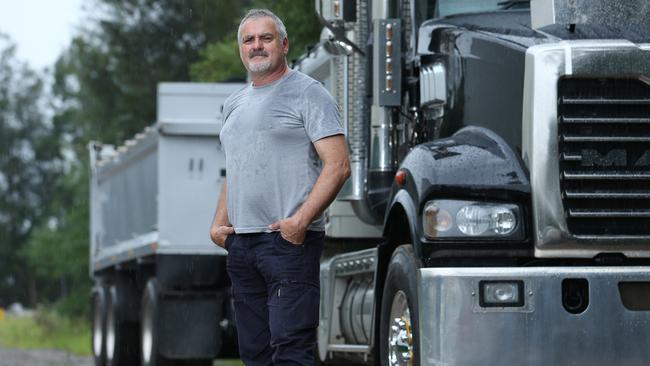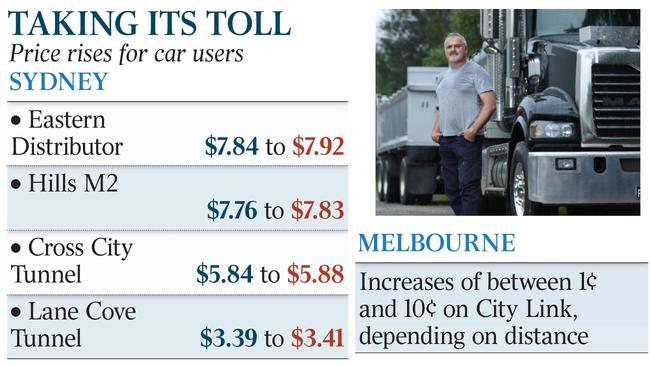Coronavirus: Aussies ‘won’t forgive’ Transurban for toll hike
Australia’s largest toll operator is under pressure to reverse price hikes, as it stands accused of making an ‘unforgivable’ decision.

Australia’s largest toll operator is under pressure from federal and state governments to reverse price hikes, as it stands accused of making an “unforgivable” decision when road transport is regarded as crucial for essential services during the coronavirus pandemic.
Transurban faced a barrage of criticism on Thursday for pressing ahead with a rise in toll charges for cars and heavy vehicles on Sydney and Melbourne motorways.
From Wednesday, Transurban increased tolls for cars between 2c and 8c a trip on four of Sydney’s major motorway routes — the Eastern Distributor, Hills M2, Cross City Tunnel and Lane Cove Tunnel — and between 1c and 10c a trip on Melbourne’s CityLink.
NSW Transport Minister Andrew Constance demanded Transurban reverse its price rise and freeze tolls for three months, saying Australians “won’t forgive or forget this decision” when everyone was taking a financial hit during the crisis.
Deputy Prime Minister Michael McCormack branded the increases “the last thing Australians need” when the only time they should be using the roads during the COVID-19 crisis was to “drive somewhere essential” for work, or to buy food or seek medical help.

Tolls were increased by up to 20c a trip for trucks and other heavy vehicles that make many trips in a single day. Many owner-operators already pay $200 to $300 a day.
Mr McCormack said truck drivers in particular were essential for the delivery of food and medical supplies, and the nation could not afford their jobs to become more expensive.
“We all have to do everything possible to save lives and livelihoods,” he told The Australian.
“Everyone needs to join the Team Australia effort and play their part in making sure Australia gets to the other side of the COVID-19 pandemic.”
Mr Constance said Transurban and its debt financiers needed to acknowledge any toll hike imposed on Australians during a disaster was “both disappointing and self-defeating”.
He said a higher number of motorists could use free alternative routes to toll motorways when hundreds of thousands of people were working from home — but lighter traffic gave Transurban no excuse.
“The NSW government has made its disappointment clear to Transurban and I urge them to reverse their decision, back our country and do the right thing,” Mr Constance said.
“Transurban should freeze their tolls for three months and then see where the world sits. Everyone is taking a financial hit at the moment, and Australians won’t forgive or forget this decision.”
The toll giant, which is scheduled to introduce CPI-linked price rises in July for other motorways it operates, stood firm behind increases imposed from the start of this month, saying the road charges allowed the company to invest billions of dollars in new road projects which had created 10,000 jobs, none of which had stopped during the coronavirus crisis.
A spokesman for Transurban Australia chief executive Scott Charlton said the company had a financial hardship scheme for motorists unable to pay their tolls in difficult times that could be reached at Linkt Assist.
Like many businesses, he said, Transurban had been significantly affected by the COVID-19 crisis, with traffic falling almost 40 per cent.
A NSW Transport memo obtained by The Australian, written this week, notes toll prices and their escalation over time are contractually set and legally binding.
It also says Transurban reduced “the government contribution required for motorways and also the overall burden on taxpayers, freeing up capacity to invest in other essential services such as hospitals, schools and public transport”.
Under contracts with state governments in NSW, Victoria and Queensland, Transurban has the right to increase its prices quarterly or annually.
Price rises are automatic — most set under formulas that adjust tolls according to rises in the CPI — although the company does have discretion not to proceed with increases if it wishes.
The company argues price hikes are necessary to help fund its other projects, including the WestConnex in Sydney and West Gate Tunnel in Melbourne.
It is understood company officials have said privately they would follow the lead of Qantas and Virgin in asking for a government bailout if toll increases were frozen.
Phil Ramondino, a 54-year-old Sydney truck driver who has recently helped bushfire efforts by carting rubble away from destroyed homes so they can be rebuilt, said he opposed any increases now when the toll companies already charged rates that made working life unaffordable for many in his industry.
“I think it’s not needed,” he said. “At the end of the day, people are just struggling to work.”
Mr Ramondino, who drives a Mack tipper and is president of the Tip Truck Association, said many owner-drivers spent $200 to $300 a day on tolls because of the many trips made in a single day making deliveries or carting materials to or from building sites.
“At Falcon Street, on the way to Mosman, it costs $7 just to go down and back up the ramp at North Sydney, and about $40 a load.”
NSW Transport Workers Union secretary Richard Olsen said the amount of money Transurban had raked in from truck drivers had left his members “frustrated, unable to understand how the charges are actually determined and unable to see over the mounting pile of expensive toll notices on their kitchen tables”.
Mr Olsen said truck operators, including owner-drivers running small businesses, were going to bear the brunt of toll industry woes.
“The pressures on drivers to efficiently move loads for clients mean that they use the toll roads, causing costs for the transport industry to be unnecessarily high.
“There is no cash-back system for heavy vehicle operators.”
NRMA spokesman Peter Khoury said the timing of the toll rises was “not ideal” but part of contractually signed agreements between Transurban and state governments.
He urged motorists who could not afford tolls to use free roads if possible.








To join the conversation, please log in. Don't have an account? Register
Join the conversation, you are commenting as Logout